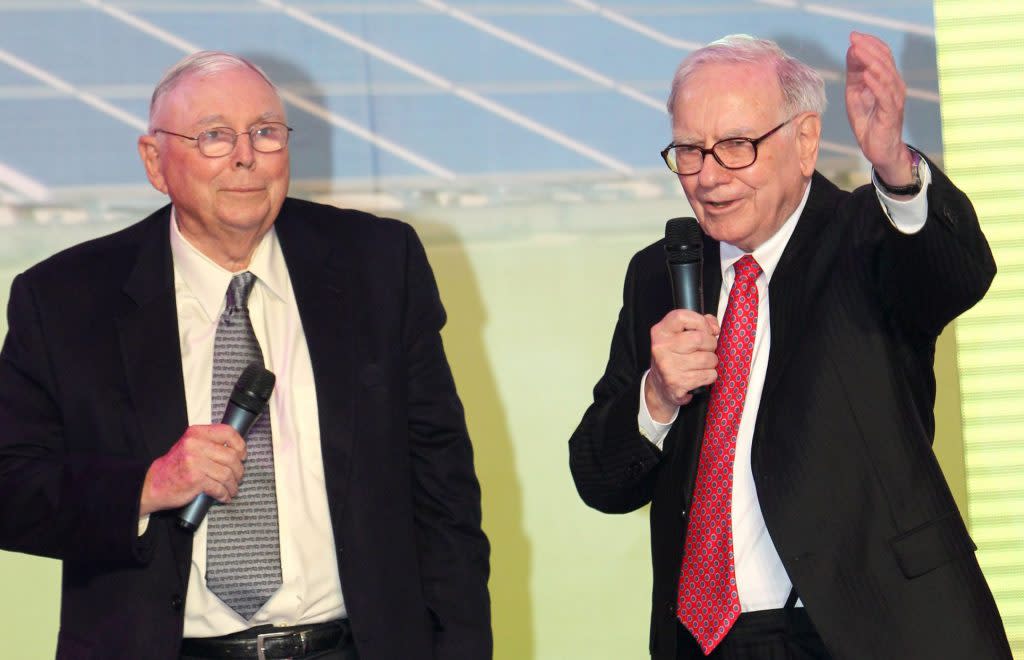Charlie Munger, legendary investor and Warren Buffett’s deputy at Berkshire Hathaway, dies at 99
Investing legend Charlie Munger, Warren Buffett's chief lieutenant at Berkshire Hathaway, has died at 99, Berkshire Hathaway announced on Tuesday.
Munger "peacefully died this morning at a California hospital," the release said, adding: "Berkshire Hathaway could not have been built to its present status without Charlie’s inspiration, wisdom, and participation.”
While Munger was a successful business leader in his own right, it was his longstanding partnership with Buffett that brought him into the public eye. The two both worked at a grocery store owned by Buffett’s grandfather as teenagers, but didn’t really get to know each other until a dinner in 1959, when Munger happened to be in Omaha after the death of his father. Almost immediately, they realized they had a bond.
“About five minutes into it, Charlie was sort of rolling on the floor laughing at his own jokes, which is exactly the same thing I did,” Buffett told CNBC in 2021. “I thought, ‘I’m not going to find another guy like this.’ And we just hit it off.”
Buffett was already an investor at that point, but Munger’s focus was his own legal career in California. By the early 1960s, however, Buffett had convinced him to give up being a lawyer and focus on finance.
Munger started his own firm, which posted an average annual compound rate of 19.8% between 1962 and 1975, nearly four times that of the Dow Jones Industrial Average, according to Buffett's 1984 essay "The Superinvestors of Graham-and-Doddsville."
Forming a dynamic duo
Buffett took over Berkshire Hathaway in 1965, but it wasn’t until 1978 that Munger joined the company as vice chairman. Despite their decades of working together in a high-stress field, the two never had a single argument, despite not always agreeing on investments like Costco, they told shareholders in 2021.
"Warren and I don't have to agree on every damn little thing we do,” Munger said at the time. “We've gotten along pretty well."
“We have, better than pretty,” replied Buffett. “We have never had an argument, really… We’ve, literally, in 62 years, we’ve never gotten mad at each other.”

It was, in fact, Munger’s investing blueprint that has helped Berkshire Hathaway. He advocated moving beyond what Buffett called “cigar-butt” investing.
“The blueprint he gave me was simple: Forget what you know about buying fair businesses at wonderful prices; instead, buy wonderful businesses at fair prices,” Buffett wrote in the company's 2015 shareholders letter. “Altering my behavior is not an easy task (ask my family). I had enjoyed reasonable success without Charlie’s input, so why should I listen to a lawyer who had never spent a day in business school (when—ahem—I had attended three). But Charlie never tired of repeating his maxims about business and investing to me, and his logic was irrefutable. Consequently, Berkshire has been built to Charlie’s blueprint. My role has been that of general contractor, with the CEOs of Berkshire’s subsidiaries doing the real work as sub-contractors.”
Beyond Berkshire
While Munger’s most active role was with Berkshire Hathaway, he also served as executive chair of the Daily Journal (DJCO), a legal software and publishing company, and remained on the board of Costco (COST), after Berkshire Hathaway exited in the third quarter of 2020.
He had a passion for architecture, designing and building five apartment projects near Los Angeles in his thirties. He also designed large dorm complexes at Stanford and the University of Michigan, as well as the house he lived in for more than 60 years.
Crypto critic
Munger’s business interests were vast, but there was one area where he never saw value or potential: cryptocurrencies.
“In my life, I try to avoid things that are stupid and evil and make me look bad…and Bitcoin does all three,” he said in April of 2022. “In the first place, it’s stupid because it’s still likely to go to zero. It’s evil because it undermines the Federal Reserve System…and third, it makes us look foolish compared to the Communist leader in China. He was smart enough to ban Bitcoin in China.”
Months later, he would double down on those criticisms, telling the Australian Financial Review, “I think anybody that sells this stuff is either delusional or evil” and comparing it to an “open sewer full of malicious organisms.”
(Munger was never shy to give a contrary opinion. In October 2023, he took aim at venture capitalists, saying "they’re not great investors—they’re not great at anything… To hell with them!”)
Philanthropy
Munger’s fortune was small compared to Buffett’s, but he was still a billionaire twice over. He was a major benefactor of the University of Michigan, giving more than $23 million over the course of his life, as well as 10 Class A shares of Berkshire Hathaway, worth more than $4 million more.
He also regularly gave to other educational institutions, including $65 million to the Kavli Institute for Theoretical Physics at the University of California, Santa Barbara in 2014. In 2016 he pledged a $200 million gift to UC Santa Barbara.
Munger did not, however, sign the Giving Pledge that was started by Buffett and Bill Gates, saying he had already violated it by transferring substantial amounts of his wealth to his children.
“Charlie’s never shaded anything he’s told me in terms of presenting it to me in a different way than reality, or he’s never done anything I’ve seen that’s self-serving in terms of being a partner in any kind of way,” Buffett told CNBC in 2021. “He makes me better than I would otherwise be and I don’t want to disappoint him.”
This story was originally featured on Fortune.com
